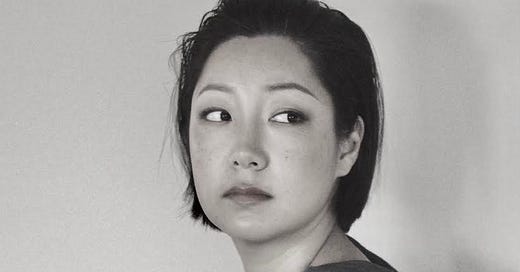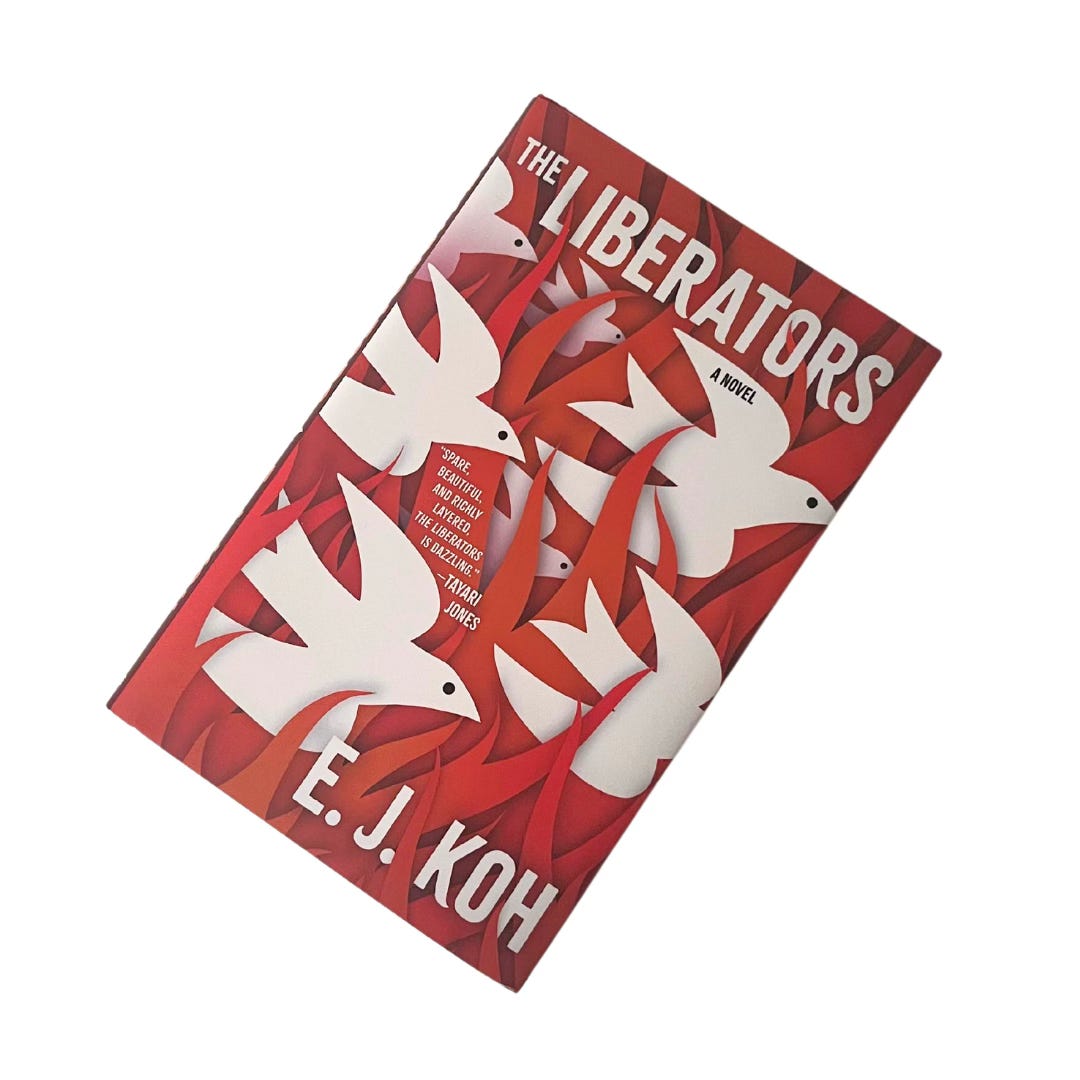An interview with E.J. Koh
"What we feel in our darkest moments can be shared": Discussing her luminous fiction debut, The Liberators
The Liberators by E.J. Koh is a compelling portrait of identity and loss following three generations of a Korean family as they navigate life in America.
The novel begins with a man—a father—in Daejeon, in the year 1980, and ends with his daughter, thirty-four years later, in Tacoma. In the pages and decades between, we meet multiple narrators (a prison guard, a coroner, a child’s pet dog), travel from a chicken coop along the railway tracks to a country “that calls itself united when not even the seasons unite them”, and enter rooms where light patterns the ceiling like tide pools.
Blood lassoes out of a body like wine. A heart takes the shape of a spoon. There is sorrow and there is light; Koh’s voice is singular, sharp as a blade, as the stem of a rose: “If it was Korean to love even the terrible parts, then maybe I was American. . . The more unbearable my outer life, the more beauty I seemed to notice in my inner life.”
Susan Sontag said that a novel worth reading is “an education of the heart” and The Liberators is precisely that— an exploration of loss and hope, memory and surrender, and as the book’s epitaph suggests, of borders both real and imaginary.
I was thrilled to have the opportunity to speak with E.J. Koh about her luminous novel, whose characters and prose continue to resonate months after my initial reading.
The Liberators opens with these words from Yohan: “I found a tool—an ink brush, a twig, or my stub finger—and used it to draw a character on parchment, dirt, or air. When one line touched another, my heart reached my fingertips to impart meaning.”
There’s a later scene where his daughter Insuk describes these typically overlooked, minute details of suburban life with lyrical insight: how the sunrise and the sound of children’s feet on the pavement outside her window belong to her. How at a certain time of night she can expect the light from the streetlamp to cast over her windowsill at an angle she has memorized. I was struck by the intimacy of these details—out of necessity, the mundane made beautiful. Can you speak to the connection Yohan, Insuk and later, her son Henry share, the significance in possessing this poetic eye?
Thank you for articulating an important aspect of these characters but also of our human lineage. You found the inheritance—not only of grief, violence, and pain—but of beauty and perseverance, which we see in the family. Also, Henry could read the valleys. He asks of the paw print—who? The glow in the distance—where? And the broken cobweb—when?
There’s another powerful scene I’ve been thinking about, in which Henry and Insuk are watching the opening ceremony of the 1988 Seoul Summer Olympics and the doves, released as a symbolic gesture, end up being burned alive by the flame of the Olympic torch. To this, Henry says: “When I saw the spectators looking up at the sky, I understood that people prayed because they could not free themselves. The doves were a memory that had to be erased—a memory that had to be forgotten in our soft, closed palms.” In The Liberators you’re also writing about the Gwangju Massacre, Korean repatriation after Japanese surrender, the Sewol ferry accident. What responsibility—and how much creative licence—do you feel a writer has when it comes to writing about historical events? How did it feel to inhabit, or live alongside, the history you were writing about?
Testimony and witness have a liberating function in human society. There is hope in understanding that our deepest fears, our suffering and grief, can be shared—and that it is a human act. We can ask ourselves whether to erase our troubling origins or reconcile with the urge to do so in the face of human history.
There is also an awareness that not only this book but I myself couldn’t have existed without the lives of those who have worked toward reparation and loving perception—so many who embody the ideal that bell hooks has expressed: “Without love, our efforts to liberate ourselves and our world community from oppression and exploitation are doomed.”
In many ways Huran and Insuk’s tense relationship forms the backbone of the novel, the axis around which these themes of identity and trauma spin. Their interactions are so profound, so brutal. Where did the inspiration for their dynamic come from?
The novel recalls my mother’s relationship with her mother-in-law, Kumiko. After my mother’s parents died tragically, she married my father and followed him, with his mother, to the US. My mother lived in the prison of their apartment. Kumiko made her feel unloved, and my mother cared for her over decades. But on Kumiko’s death bed, my mother asked whether she was sorry for all those years—for all the things that happened between them. Though Kumiko couldn’t speak, her head nodded up and down. In a way, they’d both lost their homes and were two daughters, looking for their mothers. It was the first time my mother and Kumiko had entered a room together—not as a daughter-in-law and mother-in-law—but as sisters.
The Liberators is told from multiple perspectives, some of them heard from only once. How did you arrive at the decision to tell the story this way?
The novel underscores our incendiary human lineage—a braid of destruction and reparation. To meet the personal and collective memory encoded in our history, we meet the testimonies from both the perpetrators and the liberators, from both the guards and the prisoners, while spanning across continents and generations.
“There is hope in understanding that our deepest fears, our suffering and grief, can be shared—and that it is a human act.” —E.J. Koh
In addition to this novel, you’ve also written a memoir (The Magical Language of Others) and poetry collection (A Lesser Love). Having experienced the process across three separate genres, what is something you wish you knew about publishing, a piece of advice you might offer someone who is on this journey for the first time?
There are days I wake up thinking about the losses of the past. But reading and writing—these are the things that teach me it is impossible to be alone. Even in times of great despair, when the past weighs so hard on the heart, I know the sun still shines upon every wreckage and every place on earth, upon everyone and you. That no matter what, I must not let go of hope. That what we feel in our darkest moments can be shared.
The novel begins with a dedication: For borders—real and imaginary. What do you hope readers will take away from The Liberators?
For borders—real and imaginary. So, borders in reality and in our imaginations. Borders affecting the relationships between nations, communities, and individuals. But also the borders we keep within ourselves. What happens when we cross these borders—when we dare to look at the unshared, unheard, unknown spaces, within and without?
Can you recommend 3 books that either inspired the writing of this book, or that readers will enjoy after finishing The Liberators?
The Twilight Zone by Nona Fernández, translated by Natasha Wimmer
Grieving: Dispatches from a Wounded Country by Cristina Rivera Garza
Survivor Café: The Legacy of Trauma and the Labyrinth of Memory by Elizabeth Rosner
E. J. Koh is the author of The Magical Language of Others, which won a Washington State Book Award, Pacific Northwest Book Award, and Association for Asian American Studies Book Award, and was longlisted for the PEN Open Book Award. Koh is also the author of the poetry collection A Lesser Love, a Pleiades Press Editors Prize for Poetry winner. Koh’s work has appeared in AGNI, the Atlantic, Boston Review, Los Angeles Review of Books, Poetry, Slate, World Literature Today, and elsewhere. Koh earned her MFA at Columbia University and her PhD at the University of Washington, and has received National Endowment for the Arts and MacDowell fellowships. She lives in Seattle, Washington.
To buy a copy of The Liberators, consider supporting one of E.J.’s favourite bookstores: Elliott Bay Book Company, Third Place Books, Powell's Books, Books Are Magic, Strand Bookstore.







I've read through this interview multiple times over my morning coffee, and have gotten more and more from it each time!
There's so much to sit with and reflect on, I've promptly added The Liberators and all other mentioned books to my "Need To Get My Hands On ASAP List."